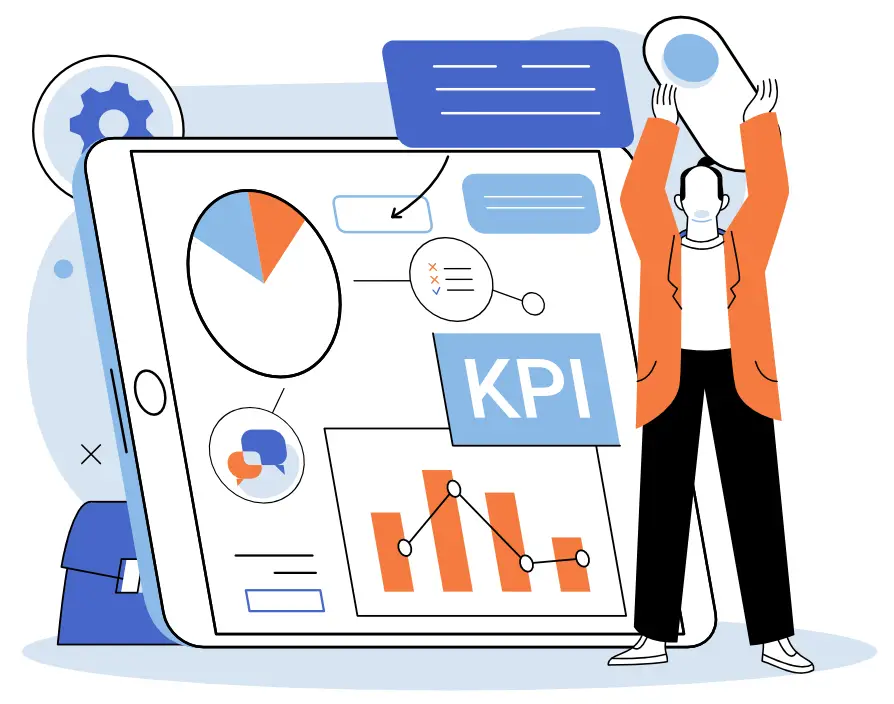With its standardized practices, the fast-paced, competitive world of franchising can be particularly prone to laser-focusing on only operational KPIs, which can miss the mark on customer experience and create a less-than-stellar customer experience (CX).
What are KPIs, and why are they important?
Key Performance Indicators (KPIs)— are quantifiable measurements that reflect how effectively a company achieves its business objectives. Common operational KPIs include sales figures, customer acquisition cost, average order value, employee productivity, etc. Customer Experience KPIs include NPS, CSAT, CES, CRR, Customer Churn Rate, CLV, ART, FCRR and Social Media Engagement Rates. Regularly monitoring these metrics allows businesses to gauge their performance, identify areas for improvement, and make data-driven decisions.
For example, a company aiming to increase brand awareness might track social media engagement or website traffic. A retailer looking to boost sales might monitor conversion rates, CLV (Customer Lifetime Value) or inventory turnover. KPIs act as a compass, guiding companies towards their strategic goals.
Potential pitfalls and solutions to an operational KPI driven model
Franchises, while known for their consistency, can sometimes fall into the trap of prioritizing internal operational KPI metrics over customer experience or customer experience metrics.
Imagine a drive-thru franchise solely focused on “average drive-thru order time.” While speed is certainly a customer expectation, prioritizing it above all else can lead to rushed interactions, low first-pass yields, order mistakes, and, ultimately, frustrated customers. A more balanced approach would involve tracking customer satisfaction alongside order speed. This way, the franchise can ensure efficiency without sacrificing quality and ensure customers leave with a positive experience.
Similarly, a franchise might have a KPI for the “number of items per transaction.” While seemingly aligned with sales goals, this metric can incentivize staff to push for upsells. This approach can pressure customers to buy more than they need, resulting in a negative experience. A better approach would be to track the “customer conversion rate” alongside post-purchase satisfaction surveys. This combination allows the franchise to understand how many people buy something and if they’re happy with it.
Even the hospitality industry can fall into this trap. A hotel franchise might focus solely on “room service delivery time” or “room refresh rate’ aiming to get food or rooms to guests quickly or as soon as possible. While promptness is important, neglecting factors like food quality and temperature or overlooking cleaning specific room elements in a rush can lead to a disappointing experience. A more holistic approach would track delivery time and customer satisfaction with the entire service experience, ensuring speed and quality are of equal measure.
Consider any membership-driven sales model, like a gym franchise solely focused on the “number of new memberships sold.” An aggressive sales push might meet this target initially, but it neglects the business’s long-term health. New members might quickly churn without proper customer onboarding and ongoing engagement efforts. A better approach would be to track new memberships, member retention rates, and satisfaction with the gym’s facilities and classes. This allows the franchise to focus on building long-term customer relationships that drive sustainable growth.
The impact of customer experience on our operational KPIs
Studies consistently demonstrate the power of positive customer experiences on operational KPI metrics. According to a PWC report, 73% of all customers say customer experience impacts purchasing decisions. Loyal customers are more likely to make repeat purchases, advocate for your brand, and spend more per transaction. Improving your customer experience, notes Zippia, can increase revenue by 10-15%, and CX Index states that customer-centric brands report profits that are 60% higher than those that fail to focus on CX.
It is important to review and reconsider the internal KPIs (both operational and CX) you are evaluating to see if they make sense or align with your typical buyer persona. I have worked with many companies with firm brand standards KPIs in place for years without looking into the impact on operational or CX KPIs. In our studies of CX KPIs combined with testing of operational KPIs, we found that not only did some of these imposed brand standards miss the mark on the customer’s experience, but they also affected their operational and CX KPIs. For example, a company insisted that employees use a certain phrase in customer interactions. This caused both the customer and the employee to be uncomfortable, leading to decreased sales and less repeat business. Removing the brand standard KPI requirement to say the dreaded phrase increased employee satisfaction, customer satisfaction, brand loyalty and customer retention. What once worked when the main buyer persona was a different generation no longer works now. As they say, just because it was always like that does not mean it should always be like that.
Striking the right balance
Operational and CX KPIs are not mutually exclusive. Strong results in one area can positively impact the other. The key is to ensure that your focus on all KPIs fosters, not hinders, excellent customer experience. This might involve reevaluating which KPIs are most important to measure. Simultaneously driving operational efficiency and customer satisfaction, companies can build brand loyalty, generate sustainable growth, and stand out in a competitive marketplace. After all, happy customers are loyal customers, and loyal customers drive business success.








